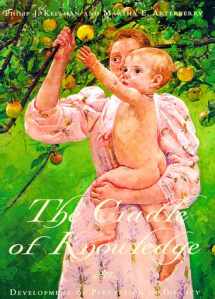
The Cradle of Knowledge: Development of Perception in Infancy (Learning, Development, and Conceptual Change)
ISBN-13:
9780262112321
ISBN-10:
0262112329
Edition:
0
Author:
Martha E. Arterberry, Philip J. Kellman
Publication date:
1998
Publisher:
Bradford Books
Format:
Hardcover
392 pages
FREE US shipping
Book details
ISBN-13:
9780262112321
ISBN-10:
0262112329
Edition:
0
Author:
Martha E. Arterberry, Philip J. Kellman
Publication date:
1998
Publisher:
Bradford Books
Format:
Hardcover
392 pages
Summary
The Cradle of Knowledge: Development of Perception in Infancy (Learning, Development, and Conceptual Change) (ISBN-13: 9780262112321 and ISBN-10: 0262112329), written by authors
Martha E. Arterberry, Philip J. Kellman, was published by Bradford Books in 1998.
With an overall rating of 4.1 stars, it's a notable title among other
books. You can easily purchase or rent The Cradle of Knowledge: Development of Perception in Infancy (Learning, Development, and Conceptual Change) (Hardcover) from BooksRun,
along with many other new and used
books
and textbooks.
And, if you're looking to sell your copy, our current buyback offer is $0.42.
Description
In the past twenty-five years there has been an explosion in research on the development of perception. This research has produced discoveries at multiple levels: ecological analyses of the information available for perception, models of representation and process, and improved understanding of biological mechanisms. In this comprehensive treatment of infant perception, Philip Kellman and Martha Arterberry bring together work at these multiple levels to produce a new picture of perception's origins. The emphasis is on perceptual knowledge—how one comes to perceive the world; what information, processes, and mechanisms produce this knowledge; and how perceptual processes change over time. They examine early perception in various domains, such as object, space, motion, intermodal, and speech perception and attempt to discover the starting points and paths of development of each. By focusing on individual experiments, they also give the reader a view of how research is conducted, including the interplay of data and theory. Two families of views compete to describe how perception begins and develops. The authors show that the traditional constructivist view, emphasizing the construction of perceptual reality through extended learning, has been disconfirmed by experimental data in many domains. An ecological view, emphasizing the role of evolution in preparing infants to perceive, provides a better overall account, but the authors show that both innate foundations and learning contribute to perceptual development. The authors also examine interactions between infants' perceptual abilities and their cognitive, social, and motor development. They argue that the new picture of early perception requires a revised view of the beginnings of human cognitive and social development.


We would LOVE it if you could help us and other readers by reviewing the book
Book review

Congratulations! We have received your book review.
{user}
{createdAt}
by {truncated_author}


